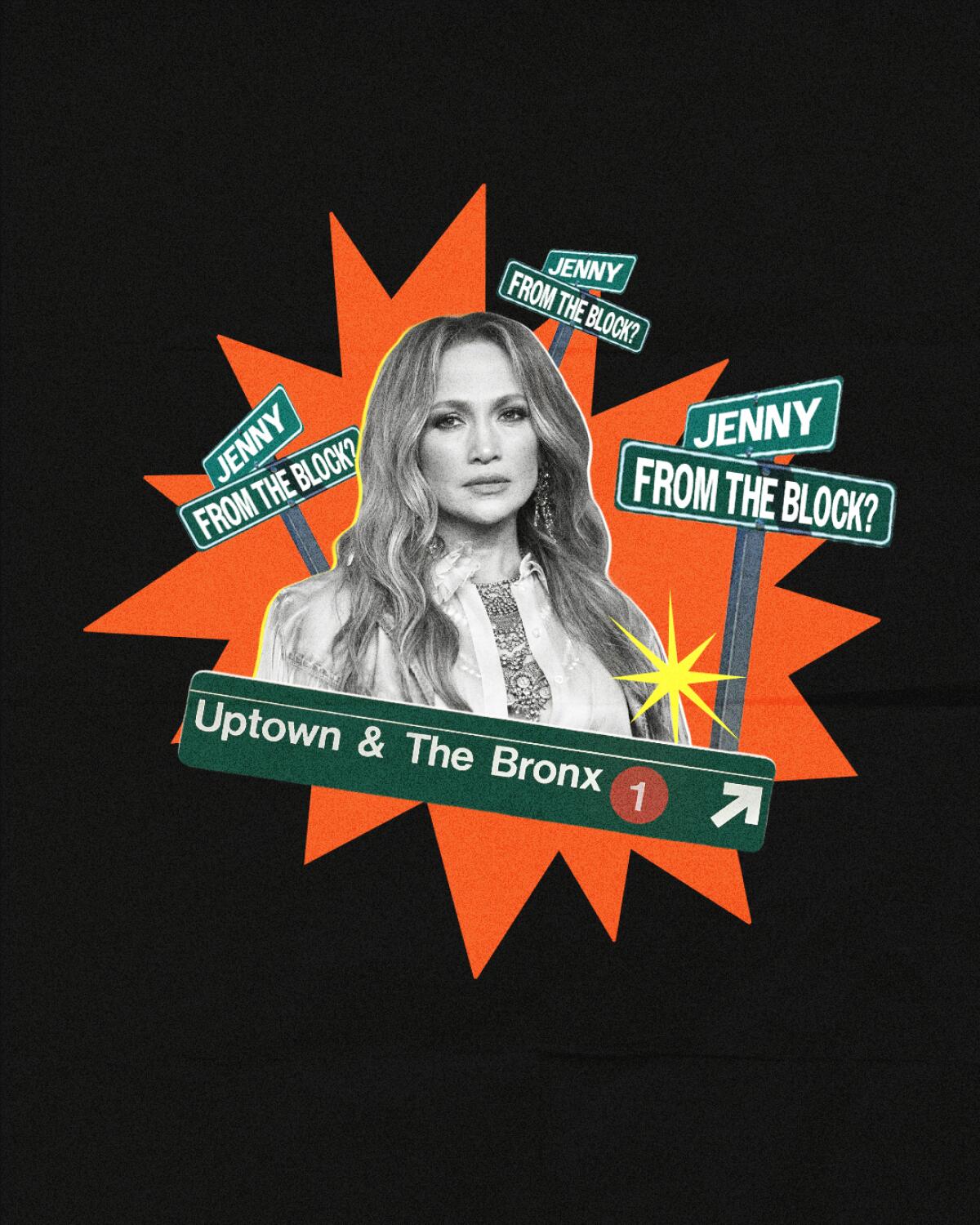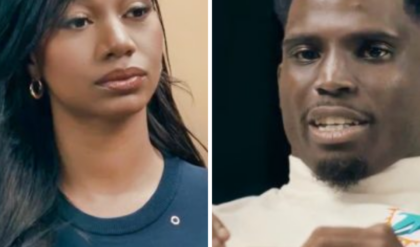Periodically, the Latinx Files will feature a guest writer. This week, we’ve asked De Los contributing columnist Alex Zaragoza to fill in. If you are not subscribed to our weekly newsletter, you can do so here.
It was a seemingly innocuous moment. Jennifer Lopez is seated, sweaty and somewhat breathless, in her home gym. She lets out her hair and shakes its wild waves out with her hands — a move as intrinsic to womanhood as taking off your bra under your shirt after getting home from work.
“I like taking my hair out like this,” she says in the 13-second clip that’s gone viral on TikTok. “It reminds me like, when I was 16 in The Bronx running up and down the block. Crazy little girl who used to be f— wild. No limits, all dreams and s—.”

The scene comes from Lopez’s Prime Video documentary “The Greatest Love Story Never Told,” which focuses on the multi-hyphenate’s storied relationship with actor Ben Affleck, her checkered history with romance, her journey of self-healing when it comes to love and the making of “This Is Me…Now: A Love Story,” a long-form music video of sorts (though do NOT call it that in manager Benny Medina’s presence) that takes us through a vaguely fictionalized version of Lopez that explores all these topics in an acid trip of feverish self-involved theater. There is also an album, but I’m already too overwhelmed to even think about it.
The gym scene set off a wave of fresh vitriol for Lopez, a celebrity who is often on the receiving end of an online firing squad for reasons ranging from her talent to her unwavering commitment to being so unabashedly JENNIFER LOPEZ, carrying herself in all-caps, bold-font fashion. As writer Hunter Harris put it in her newsletter, “Hung Up,” “The doc is 90 minutes of J.Lo speaking candidly and emotionally about the gargantuan effort it takes to, at every single moment, choose to be J.Lo.”
Being Jennifer Lopez has come to mean a few things, like being the encapsulation of the early ‘00s term “bling bling;” an alleged disdain for virgos; proclamations of being “real;” loving big, loudly and often; and defying the aging process through a stringent disciplined lifestyle (aided by chefs and trainers and nannies, etc.) that us wrinkling, Taco Bell-eating normies can’t touch.
But arguably the biggest element of J.Lo’s persona is being from the Bronx. She’s “Jenny from the block,” proclaimed in song, in interviews she’s done over the last 30+ years of her career and the Super Bowl Halftime show. It’s the latest reminder of her lore as a simple Bronx girl who made it big that has now called into question her authenticity.
TikTok users came out hard in the comments section and in response videos. She was called a “delusional chaos demon” and the clip was seen as a failed attempt by the megastar to prove her humility and force a connection to her hometown.
“I understand that you’re trying to milk this whole ‘I’m humble, I’m from the hood.’ This story doesn’t really work for you anymore…” says TikTok user cillaminian in a video. “This whole story of her trying to seem relatable and more, you know, ‘normal,’ it’s not really gonna work for you. Just stop.”
The clip opened up a rehashing of other instances where Lopez mentioned her block roots in ways that critics say proves a tenuous, forced connection to her hometown, like a 2022 Vogue 73 Questions home tour where she says her go-to bodega order was a “ham and cheese on a roll with an orange drink, adding “if you know you know” at the end to prove her bona fides.
The “if you know you know,” some say, is doing some heavy lifting, with many questioning if her order is a true Bronxite bodega order.
Authenticity is a tricky land mine, however, and online, both engagement-seeking trolls and genuinely annoyed or upset people end up policing someone’s personal experiences because it doesn’t align with their own.
The need to examine and re-examine ourselves can sink us into a mirrored cave where we believe everything we experience is happening for the first, or most important, time ever. Lopez certainly has a penchant for navel gazing. But is she inauthentic? Isn’t anyone who has to live their life publicly to a certain extent?
Authenticity and personal narrative have long been a part of the fame machine, and performing authenticity is a razors-edge walk for anyone in the spotlight. Audiences turn on you as soon as you become too annoying, too present, too cute, too anything, particularly if you’re a woman. (Truly not something men in Hollywood have to deal with.)
Since the early days of Hollywood, movie stars were made by studios and creating an authentic persona was top of mind through the star system, said Claire Sisco King, associate professor at Vanderbilt University and author of “Mapping the Stars: Celebrity, Metonymy, and the Networked Politics of Identity.”
“Celebrities are praised for seeming authentic and giving their audiences a sense of intimacy and familiarity with them,” she added. “Such authenticity is often linked to stars’ backstories, particularly tales of humble beginnings or triumph over hardships. Audiences don’t find the appeals to authenticity to be credible in the context of Lopez’s extreme wealth and privilege. These reactions relate to the tension within celebrity culture between artifice and authenticity, and Lopez seems to have been caught in that contradictory space.”
The documentary might have hurt Lopez’s appeal to authenticity, Sisco King says, because it lays bare “the extent to which she is playing a part and building a brand.”
But that is part of Lopez’s job. That is the system she works in. And besides, aren’t we all Jennies of different types of blocks if we rely on audience approval for our work?
All women celebrities have higher expectations of authenticity placed on them, according to Sisco King, and that derives from cultural expectations about women as “highly emotional, nurturing, and relational” individuals. The standard is even higher for women of color since they also are expected to serve as representatives for their communities.
Lopez’s backstory is certainly a defining part of her narrative, especially because her lore is the kind of rags-to-riches, bootstrap story that inspires, especially coming from a working-class Latina. She carries herself in many ways as the underdog constantly overcoming adversity and doubts. It’s there in “The Greatest Love Story Never Told,” her Netflix doc “Halftime” and in countless interviews.
But she is also massively successful, incredibly rich and inarguably powerful. She could drop $20 million of her own money to finance a movie about her complicated love life. Lopez is deeply committed to her hero’s journey, even if she’s repeating the story arguably too much.
Lopez’s performance of authenticity by way of her connection to her roots feel less exploitative or fake as much as it’s the far less criminal act of being cringey. To her credit, Lopez has never let possible embarrassment stop her from living the “lets get loud!” life. You have hand it to her because most of us couldn’t handle the heat.
More than anything, this entire backlash comes with the realization that one day, if you’re too successful or moved away from home, that place and its people may reject you. Staying connected to your roots while also chasing after something bigger is hard, and can mean losing something meaningful to you, unless you’re making investment into that place a priority regardless of where you’ve landed. But even that’s not a guarantee. It’s the premise of basically every Hallmark movie. While sometimes we need to be humbled, authenticity can only mean what it means to you.





